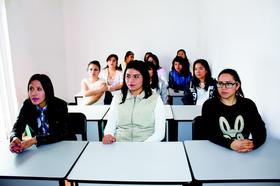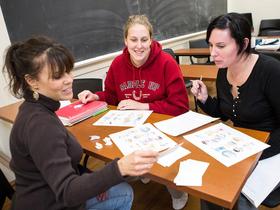The typical community college student has never been particularly traditional, but in recent years, demographics on community college campuses have become even more diverse. One student profile that has seen a significant increase at two-year schools across the country is the baby boomer looking for additional career training or self-improvement opportunities. As schools have seen more over-50 students hit their campuses, many have made adjustments to make those students feel more at home.
The Rise in Baby Boomers
USA Today reports that according to the American Association of Community Colleges, 388,000 students over the age of 50 were enrolled in community colleges in 2009. The number indicates a 6-percent increase from 2007 and a 12-percent rise from 2005. Currently, people in this age demographic make up around five to six percent of the total community college population across the country.
There are many reasons why baby boomers are hitting the books later in life today. Many are looking for career advancement or changes, and require additional training to get where they want to go. Some have been laid off of jobs they held for the majority of their adult life and need training and a new direction to make themselves marketable once again. Still others are simply attracted to the process of learning – and the chance to better themselves by learning something new. No matter what the reason might be for heading back to school, it can be an intimidating step to venture onto a college campus after many years out of the school scene.
Making a Place for the Non-Traditional Student
Community colleges across the country are finding benefit in opening their campuses to a more mature student population. According to a report at Inside Higher Ed, baby boomers are living longer, have more active lives, and wish to remain in the workforce much longer today. As a result, community colleges can tap into a valuable section of the workforce by providing them with updated skills and training that allow them to be productive members of various industries for many more years.
“To meet future demands, we need to prolong the labor force participation of aging baby boomers. We need to increase educational opportunities for the current work force,” Mary Sue Vickers told Inside Higher Ed. Vickers is the director of the AACC’s program designed to help seniors make a smooth transition back to college known as the Plus 50 Initiative. This program is currently being adopted by colleges across the country to help over-50 students succeed in a college setting.
Some communities with large baby boomer populations are finding that this age demographic is essential for a robust workforce. For example, Rosemary Dillon, the dean of health sciences at Cape Cod Community College told Inside Higher Ed that with one-third of the Cape Cod population consisting of residents over the age of 50, it is essential to keep that group trained and actively contributing to the workforce needs of the area. To that end, Cape Cod Community College has made special effort to engage the aging population into the community college environment, with conferences and seminars designed to turn this demographic on to the benefits of higher education. They also pay attention to the details that make school more comfortable to boomers, such as printing class syllabi in a larger print and equipping all classroom instructors with microphones.
The Plus 50 Initiative
To help colleges provide for their older learners, the American Association of Community Colleges introduced the Plus 50 Initiative in 2008. This program is designed to offer tools and knowledge community colleges need to attract and engage a wider demographic of students. According to the Plus 50 Initiative website, community colleges are invited to participate in three-year grant programs in learning teams. The teams are composed of demonstration colleges that are launching the Plus 50 program for the first time and mentor colleges that already have established programs the demonstration schools can use as models for their own programs.
The launch of the Plus 50 Initiative coincided with the start of the current recession, offering opportunities to baby boomers that might have been faced with layoffs and other career challenges.
“The timing of the program coincided with the economy tanking,” Vickers told the Sun Times. “401(k)s dropped dramatically. Home values dropped. The colleges saw more and more of the people coming were coming for workforce training or retraining.”
Baby boomers heading back to school provide a challenge to community colleges accustomed to managing a younger generation of students. Those in this age category tend to have a unique set of needs, are looking for the fastest, most efficient paths possible to further their education and their careers. Community colleges that learn to address and meet those needs head-on will have the best luck at attracting more baby boomer students onto their college campuses.
“What we’re trying to offer them is accelerated programs that will not take them long periods of time to complete,” Jerone Gamble, completion coordinator at College of Central Florida, told the Sun Times. Gamble added that tax return preparation and security officer training are two of the most popular programs for baby boomers at this time.
Those who are over 50 and looking to complete a community college program will find plenty of flexibility in terms of degree programs, online and weekend courses and accelerated classes. By choosing a college involved with the Over 50 Initiative, they are more likely to find a school that meets them where they are at and helps them succeed.














